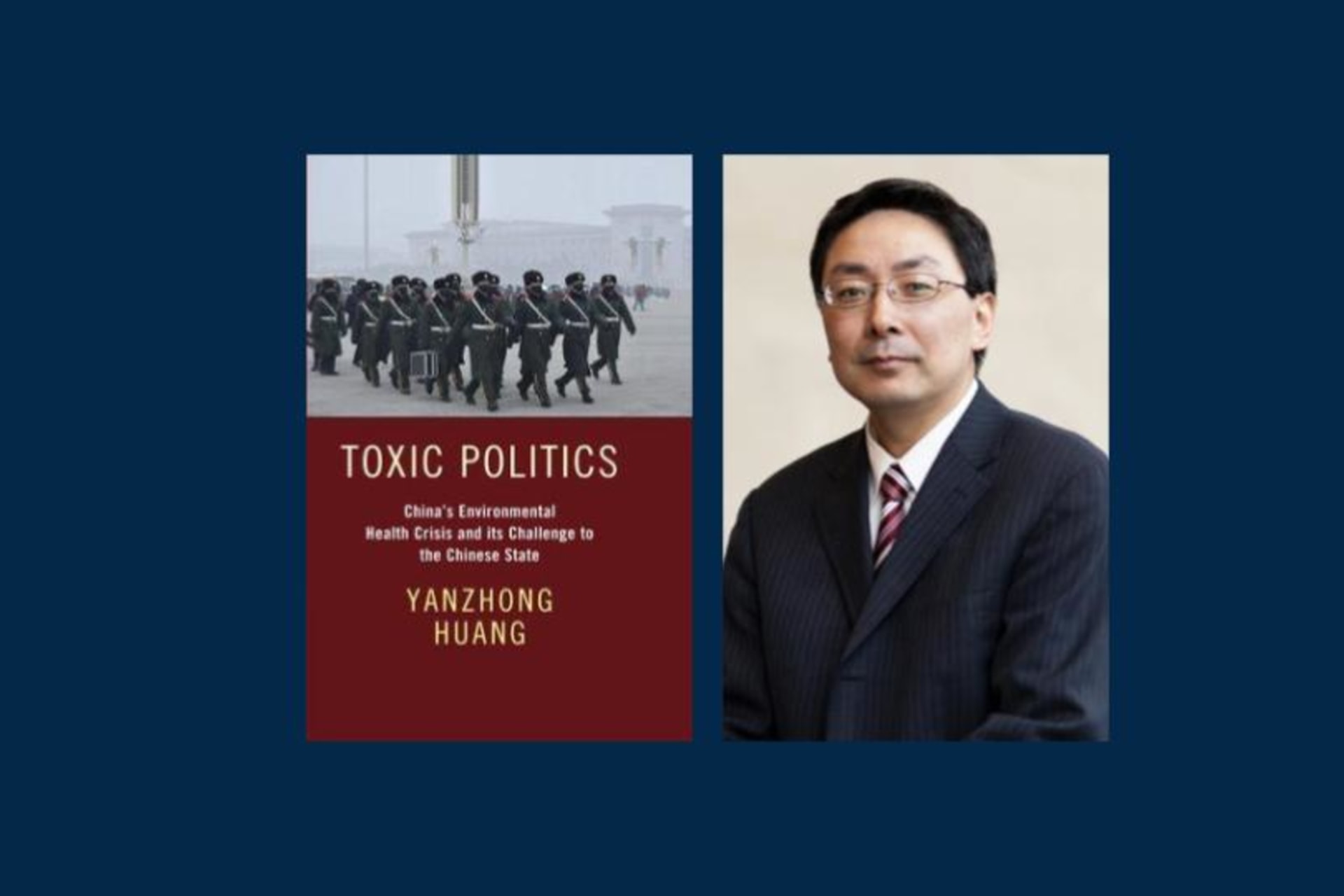Toxic Politics
In Toxic Politics, CFR Senior Fellow Yanzhong Huang discusses how China’s environmental crisis is undermining public health and becoming an Achilles heel in its reemergence as a global power.

Summary
In Toxic Politics, Yanzhong Huang delves into the environmental health crisis that has beleaguered the Chinese state throughout its dizzying economic development. Environmental degradation in China has not only brought a wider range of diseases and other health consequences than previously understood, it has also taken a heavy toll on Chinese society, the economy, and the legitimacy of the party-state. Dr. Huang presents new evidence of China’s deepening health crisis and challenges the widespread view that China is winning the war on pollution. Although government leaders are learning, stricter and more centralized policy enforcement measures have not been able to substantially reduce pollution or improve public health. Dr. Huang connects this failure to pathologies inherent in the institutional structure of the Chinese party-state, which embeds conflicting incentives for officials and limits the capacity of the state to deliver public goods. Toxic Politics reveals a political system that is remarkably resilient but fundamentally flawed.
This book is suitable for the following types of undergraduate and graduate courses:
- Environmental Policy
- Global Public Health
- Chinese Politics and Public Policy
- Chinese Foreign Policy
Discussion and Essay Questions
Courses on Environmental Policy
- What is unique about China’s environmental challenges as compared to those experienced by Western countries?
- What role does citizen feedback and NIMBYism play in China’s environmental policy process? How does this role differ in other parts of the world?
- Unlike in Western countries, most of the environmental public interest litigation (EPIL) lawsuits in China have been initiated by government departments and local procuratorates. Why have environmental NGOs played a limited role in using EPILs to enforce environmental laws in China?
- Between 2013 and 2018, China cut concentrations of PM2.5 by 46 percent, a measure which took the United States approximately twenty years to achieve after its passage of the Clean Air Act in 1970. Is this evidence that “China’s version of capitalism” is winning?
- To what extent has the tension between economic growth and environmental protection hindered China’s shift away from its dependence on coal for energy and on heavy industry in order to drive its economy?
- What drivers have restricted the effective use of market mechanisms in environmental protection in China?
- Supporters of eco-authoritarianism or environmental authoritarianism argue for the inevitability and necessity of nondemocratic measures in dealing with environmental degradation to combat climate change. Is this argument substantiated by the case of China’s pollution control?
Courses on Global Public Health
- What are some of the main linkages between the environment and public health? What is the largest single environmental health risk in China?
- Why is ambient PM2.5 the number one risk factor for pollution-related mortality in China? What has been the leading contributor of deaths caused by ambient PM2.5 in the country?
- To what extent can water and soil pollution contribute to a food safety crisis?
- What are “cancer villages”? What makes the phenomenon different from the cancer clusters identified in other countries?
- Why is garbage disposal a major environmental health problem? Why has China’s ban on imports of “foreign garbage” become a global governance concern?
- How does China’s size and economic might factor into the health effects of environmental degradation?
- Can you identify parallels between China’s pollution control campaigns and its response to the COVID-19 outbreak?
Courses on Chinese Politics and Public Policy
- How can China’s response to environmental health issues serve as a springboard to examine the resilience of the Chinese state?
- How do environmental health challenges affect China’s national economy and create volatile sociopolitical situations?
- How has China’s opaque and exclusive authoritarian system prohibited social forces and international actors from influencing policymaking in the country?
- After reading this book, are you convinced that decades of reform and opening up have shifted China away from the impromptu and undemocratic policy-making processes characteristic of the Maoist era? Why or why not?
- How has the recreation of a bandwagon polity under Xi Jinping altered the institutional aspects of policy implementation in China?
- To what extent should the phenomenon of cengceng jiama, to impose additional targets and requirements at every lower administrative level, be viewed as a byproduct of the authoritarian governance structure in China?
- Why do local officials tend to adopt a cookie-cutter approach to implementing central directives?
Courses on Chinese Foreign Policy
- How have international trade and investment contributed to environmental degradation in China? Why is environmental degradation in the country bad for other countries, including the United States?
- What roles have the United States and international organizations played in democratizing air quality data and elevating pollution control on the Chinese government’s agenda?
- To what extent has China’s push for pollution control promoted a more cooperative approach toward global efforts to combat climate change?
- In what ways do China’s enormous environmental health problems represent both a challenge to and an opportunity for China’s engagement in global governance?
- Is China’s Belt and Road Initiative a backdoor to outsourcing pollution?
- To what extent can a major internal challenge like an environmental crisis translate into a stumbling block in China’s rise?
- Given the consequences of China’s environmental health crisis and the limited effectiveness of the state response, is letting China sink an effective way to maximize U.S. competitive advantage? Why would it be in the United States’ best interest to cooperate with China on environmental and public health issues?
Further Projects
Policy Brief
- Write a two-page policy brief to the director-general of the World Health Organization (WHO) evaluating the Chinese government’s response to its environmental health challenges. The policy brief should focus on China’s ability to meet tangible policy targets, whether implementation of policy conformed to procedures stipulated in the policy documents, as well as unintended and undesirable outcomes that undermined the achievement of other policy goals. In your policy recommendations, provide a framework for the WHO to promote better environmental health outcomes in China.
- Write a two-page policy brief to the U.S. secretary of state examining the economic, social, and political implications of China’s environmental health crisis; evaluating their capacity to handle such internal challenges; and summarizing implications for U.S. foreign policy. In your policy recommendations, advise on whether the United States needs to challenge ideology in the face of growing U.S.-China rivalry.
- Chinese President Xi Jinping recently pledged to the United Nations General Assembly that the country would become carbon neutral by 2060. Write a two-page brief to the UN secretary-general assessing China’s ability to achieve this policy goal and what countries can do to encourage China’s commitment to emission reduction.
Analytical Essay
Write a 1,500-word essay answering the following questions:
- In its industrialization and modernization, China has followed a path of “pollution first and protection later,” similar to that of developed countries. For many Chinese, pollution and its health consequences are the necessary evil released from the bottle of development. The implication is that China—like its Western counterparts—eventually will manage to control pollution and its health consequences. Do you agree? Explain why or why not.
- Compare and contrast the fate of Chai Jing’s Under the Dome in China with that of Rachel Carson’s Silent Spring in the United States. What are the gains and limitations of environmental activism in China?
- Unlike many Western countries, China has approached pollution and COVID-19 through intense, politically charged campaigns. What are the pros and cons of such top-down mobilizational approaches?
Debate
For each of the questions posed, divide into two teams arguing different sides:
- In China’s campaigns against pollution, the government has introduced distinctive mechanisms, including environmental supervision talks, “party-administration shared responsibility,” and central environmental protection inspection. Should these measures be treated as institutional innovations that enable an authoritarian Chinese state to achieve long-term goals?
- The former administrator of China’s Environmental Protection Agency once said, “without abating pollution and protecting the environment, the party will be destroyed and the nation will be subjugated.” Is this an overstatement?
- Many contend that China’s experience in controlling air pollution and containing the COVID outbreak attest not only to the resilience of the authoritarian state but also to the superiority of the Chinese political system. Does the China model, featuring one-party rule and state capitalism, represent a viable alternative to liberal democracy?
Supplementary Materials
Elizabeth Economy, The River Runs Black: The Environmental Challenge to China’s Future (Ithaca, NY: Cornell University Press, 2004).
Elizabeth Economy, The Third Revolution: Xi Jinping and the New Chinese State (New York: Oxford, 2018).
Daniel K. Gardner, Environmental Pollution in China (What Everyone Needs To Know®) (New York, NY: Oxford University Press, 2018).
Yifei Li and Judith Shapiro, China Goes Green: Coercive Environmentalism for a Troubled Planet (Polity Press, 2020).
Genia Kostka and Chunman Zhang, “Tightening the Grip: Environmental Governance under Xi Jinping,” Environmental Politics 27, no. 5 (2018).
Anna Lora-Wainwright, Fighting for Breath: Living Morally and Dying of Cancer in a Chinese Village (University of Hawai’i Press, 2013).
Carl Minzner, End of An Era: How China’s Authoritarian Revival is Undermining Its Rise (New York: Oxford University Press, 2018).
Andrew Nathan, “China Since Tiananmen: Authoritarian Impermanence,” Journal of Democracy 20, no. 3 (July 2009).
Minxin Pei, China’s Crony Capitalism: The Dynamics of Regime Decay (Cambridge, MA: Harvard University Press, 2016).
Jennifer Rudolph and Michael Szonyi, The China Questions: Critical Insights into a Rising Power (Cambridge: Harvard University Press, 2018).
David Shambaugh, China’s Future? (London: Polity, 2016).
